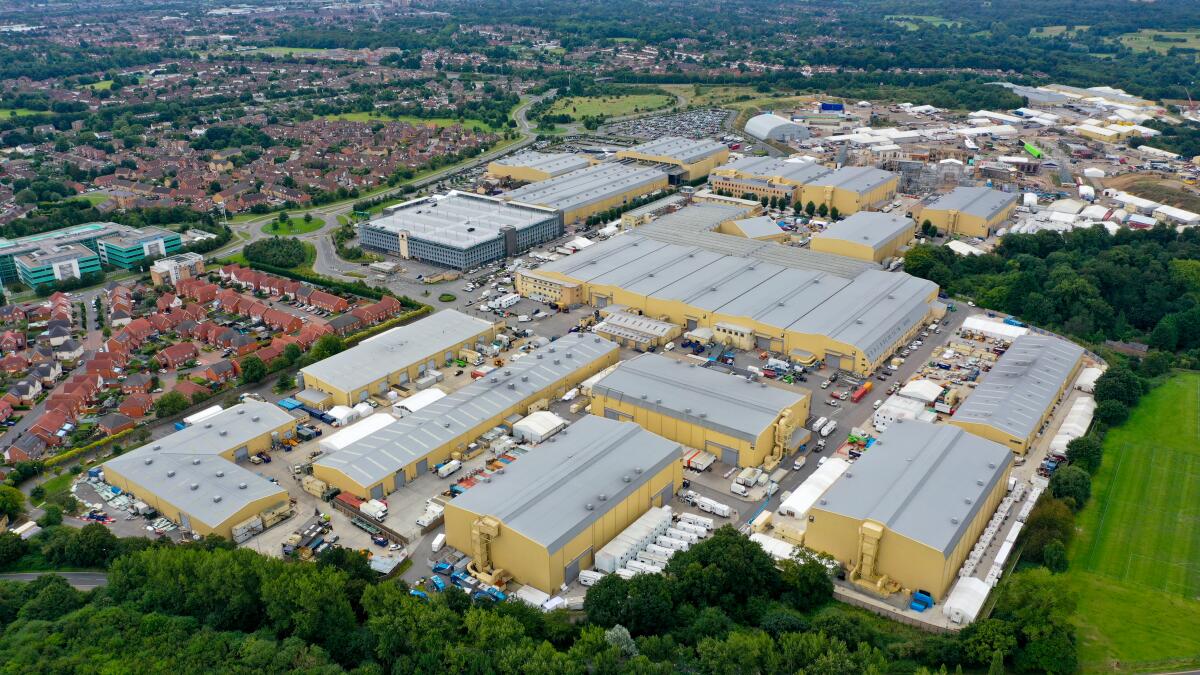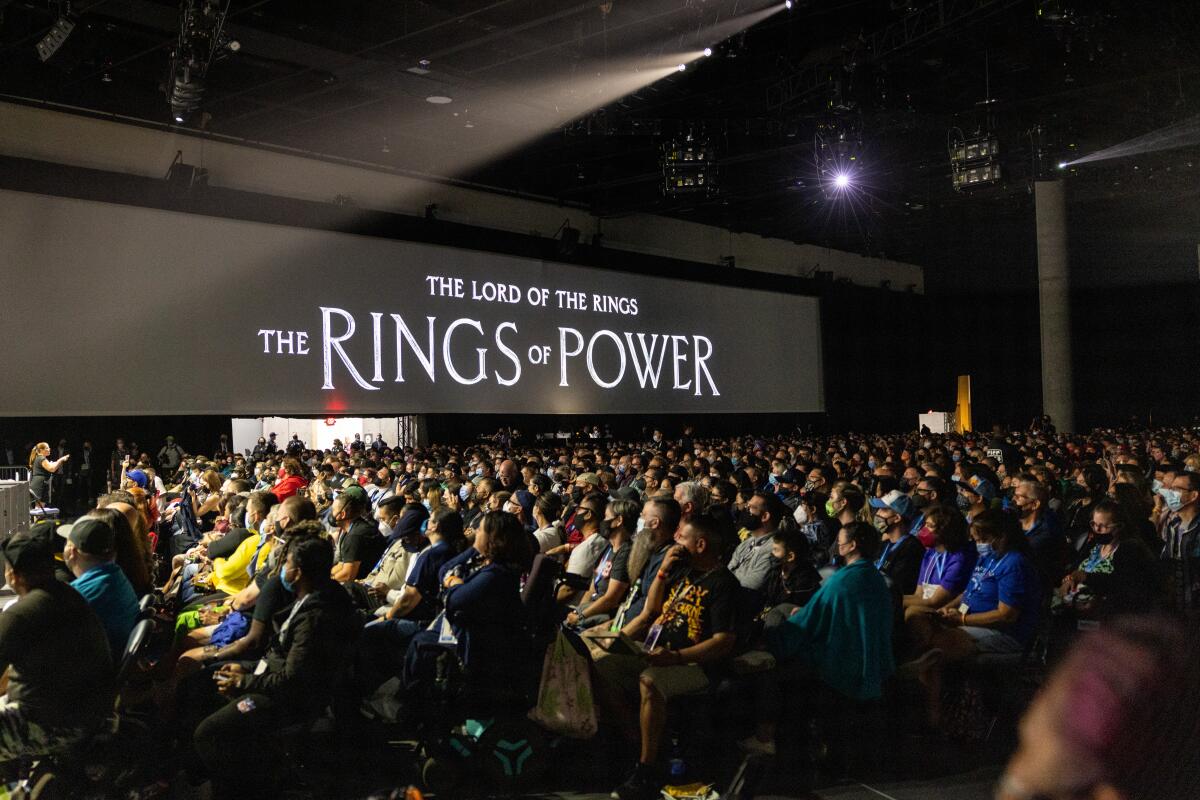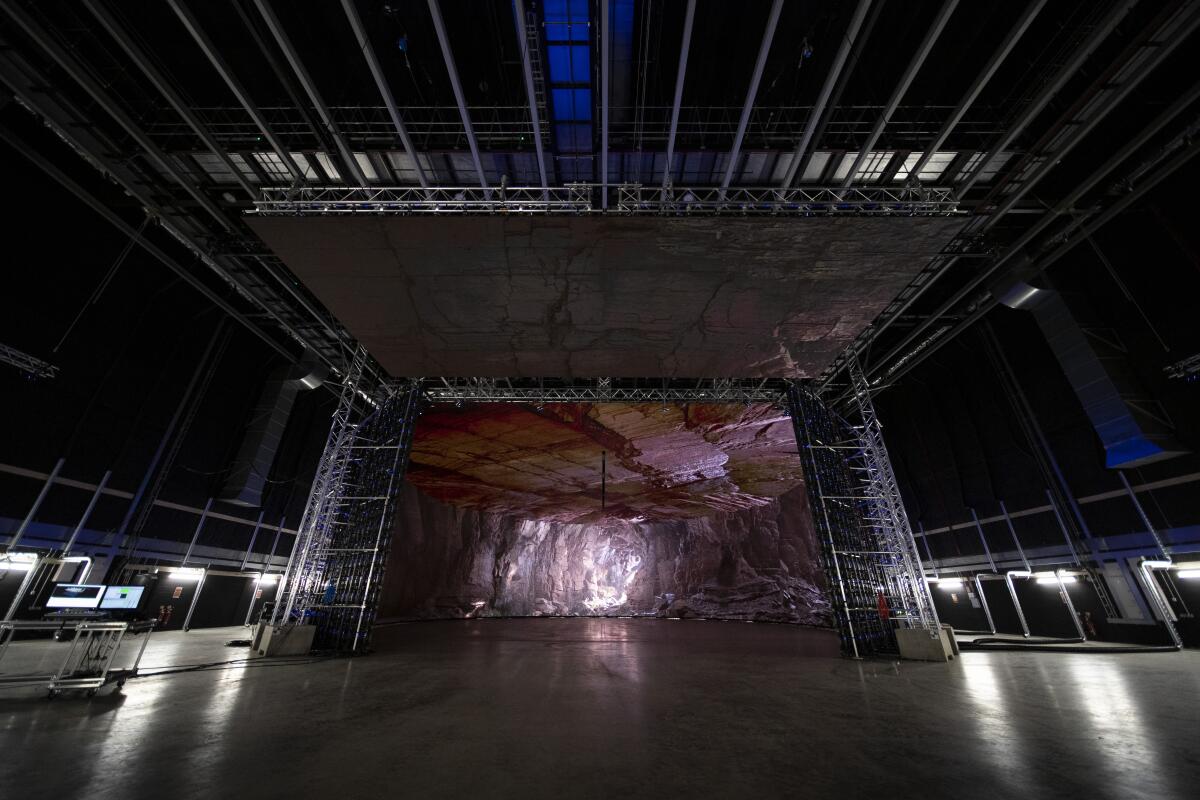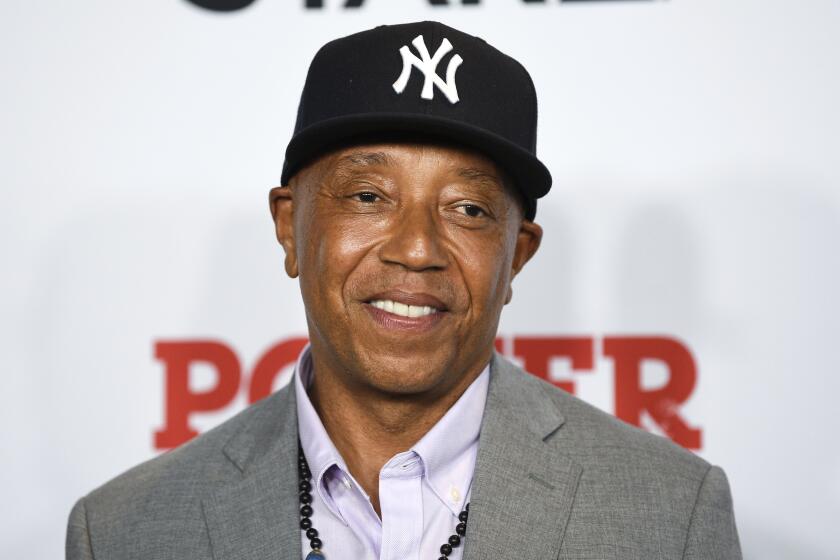Hollywood production in U.K. soars to record levels as crews complain of burnout

- Share via
LONDON — In the far corner of Warner Bros. Studios Leavesden, star Vin Diesel was having a smoke with a colleague between takes for “Fast X”; a car flip scene was being filmed for the latest in the “Fast & Furious” franchise.
He rested on a barrier under a hot August sun, overlooking a 50-acre field that housed the remains of Kings Landing’s Red Keep — a vestige of the castle set from the yearlong filming for HBO Max’s eagerly awaited “Game of Thrones” prequel, which debuted Sunday night.
While the original hit series was filmed in Northern Ireland, Leavesden expanded its facilities to help convince the filmmakers of “House of the Dragon” to shoot in England.
The studio, a former World War II aircraft factory in Watford, has been booked out as production levels are busier than ever. Since Warner Bros. acquired Leavesden in 2010 for $161.4 million, the lot has doubled in size, growing to 20 stages from nine, spanning 1.5 million square feet.
Warner Bros.’ “Barbie” and “Wonka” just wrapped filming on the lot. Universal Pictures also is planning to film part of “Wicked” — the film adaptation of the Broadway musical starring Ariana Grande and Cynthia Erivo — at Leavesden.
“It’s a really exciting time. And it’s incredibly busy,” said Emily Stillman, senior vice president of Leavesden. “We had some space become available in the second half of this year and we filled that almost immediately. We could have sold that again, two or three times over.”
After the COVID-19 pandemic caused numerous shutdowns and delays, the U.K. is once again seeing a surge in production activity.
Spending on film and high-end television shoots reached a record 5.72 billion pounds ($6.73 billion) in the fiscal year ended in June, according to the British Film Institute. Television production during the period reached 3.88 billion pounds ($4.56 billion), the highest level on record.
The U.K. has a long tradition of film production, from the James Bond movies to the Star Wars and Harry Potter franchises. Studios and streaming companies are taking advantage of some of the world’s most stable and lucrative film incentives, which were recently expanded to include TV, animation and video games.
“There’s been an absolutely colossal amount of film and television production happening in the U.K. We’ve broken all records in terms of inward investment,” said Adrian Wootton, chief executive of the British Film Commission. “We’re very much an agent of growth, an agent of recovery, for the U.K. economy.”

The boom has been driven by several factors, including pent-up demand caused by earlier shutdowns, favorable exchange rates and a slew of high-end television productions from Netflix, Apple, Amazon and other streaming giants reshaping the TV industry.
High-profile shows filming in Britain include the third season of “Ted Lasso” for Apple TV+, Netflix’s fifth season of “The Crown” and “Bridgerton” spinoff “Queen Charlotte” for Netflix and Shondaland.
Then there’s Amazon’s much-anticipated “The Lord of the Rings: The Rings of Power” series, which announced earlier this year it was moving its second season from New Zealand to Shepperton, Surrey. The series debuts next month.
In February, Amazon signed a multimillion-pound long-term lease with Shepperton Studios as part of a plan to expand “its production footprint and investing in studio space across the U.K.,” the company said in a statement.
Amazon declined to comment further on its plans.
“It’s just gone absolutely thermonuclear,” said Spencer MacDonald, national secretary of Bectu, the union representing over 40,000 staff, contract and freelance workers in the media and entertainment industries. “The amount of content that [streaming companies] are trying to produce is just phenomenal.”
The soaring demand has created a shortage of stage space.
The prospects have drawn Los Angeles-based real estate companies such as Hudson Pacific Properties and Hackman Capital Partners, among other major private equity funds.

Hackman, which has developed major Southern California film locations such as the Culver Studios and Television City Studios, broke ground in June on what it describes as London’s largest film and TV production center.
With 12 stages over a total studio space of more than 500,000 square feet, Eastbrook Studios in Dagenham promised to boost the East London area, creating 1,200 jobs and contributing 35 million pounds ($41 million) per year to the local economy, Hackman said in its 2020 announcement. The new studio is expected to be open next year.
Eastbrook is expanding into London’s east, where a younger, more diverse crew base lives, said Jason Hariton, chief real estate officer for the MBS Group, an affiliate of Hackman Capital. The company has seeded an endowment for crew development and job training in East London.
“It’s a business where if the doors are open, then people have an opportunity for high-paying work quickly,” Hariton said. “London is a fantastic, top-five shooting location for high-end TV and film in the world.”
Blackstone and Hudson Pacific Properties are behind another studio project in England. They plan to invest over 700 million pounds ($822 million) building Sunset Waltham Cross north of London, which they said is due to open in 2025. It is the first international expansion of their Sunset Studios, where movies such as “La La Land” were filmed.
Britain’s generous film incentives — a 25% cash rebate that applies to actors’ salaries and other so-called above-the-line costs — have been a big draw for studios like Warner Bros. The weakening British pound also has made U.S. dollars go further.
“It’s pretty close to the perfect incentive,” said Joseph Chianese, senior vice president at Burbank-based Entertainment Partners. “In the U.K., they really see the film and TV industry as an integral part of their economy. It’s a real economic driver.”
Aside from the tax incentives, Hollywood studio executives point to the quality of local crews.
“You can make an entire movie with local crew and that’s a big benefit,” said Jeff LaPlante, president of physical production at Universal Pictures. “They have great technicians.”

During a visit to Los Angeles in May, London Mayor Sadiq Khan announced plans with Universal Pictures to create a training program to cultivate more diverse crew members. Under that plan, the studio agreed to have young Londoners from underrepresented communities work on British productions this year such as “Wicked” and “Fast X.”
All the growth has created an overall shortage of crews. Film and premium television production is expected to reach 7.66 billion pounds ($9 billion) by 2025, requiring nearly 21,000 crew to meet demand, according to a report by ScreenSkills, a nonprofit that trains crews.
The rapid growth is creating “highly pressurized workplaces,” which could become a detriment to the British film industry, the report said.
Labor tensions also have been on the rise as crews, like their U.S. counterparts, work longer hours to keep up with demand.
Bectu’s MacDonald says the industry needs to “make it more attractive for people to come in and ... also addresses the issue for people already in the industry, so people don’t get burned out and they don’t leave.”
Meanwhile, producers worry about rising labor costs.
“If the U.K. becomes too expensive, they’ll just move production,” said John McVay, chief executive of PACT, the trade body representing independent production and distribution companies in the U.K.
Leavesden is adapting to help attract crews. Stillman started a child-care facility on the lot for its freelance workers. The complex also includes a state-of-the-art gym, where crew line up from 5 a.m. to work out before the day starts, she said. The studio also offers mental health services for workers who want support.
“What we’ve got to do ... is make sure that we keep investing in all the elements, whether that’s people or facilities and spaces, or confidence in the tax credit,” Stillman said. “All those elements have to come together to keep this momentum going.”
More to Read
Inside the business of entertainment
The Wide Shot brings you news, analysis and insights on everything from streaming wars to production — and what it all means for the future.
You may occasionally receive promotional content from the Los Angeles Times.











